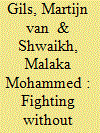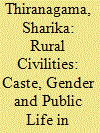|
|
|
Sort Order |
|
|
|
Items / Page
|
|
|
|
|
|
|
| Srl | Item |
| 1 |
ID:
142675


|
|
|
|
|
| Summary/Abstract |
THIS SPECIAL SECTION IS DEDICATED TO FAMILY LIFE, health, and reproduction in the context of Russia and Ukraine. One important component in post-Soviet transformation in the social sphere was idealisation of the ‘traditional family’ (Zhurzhenko 2004, 2008). In fact, a neo-conservative discourse, which promotes traditional family life and denounces homosexuality and abortion, has increasingly come to dominate post-Soviet Russia in the last decade (Rodin & Åberg 2013). This discourse can partly be linked to the growing influence of the Russian Orthodox Church and to religion becoming an important identity marker for Russian nationhood, partly to Russia’s demographic problems with a shrinking population, and ultimately to a general and rising nationalistic discourse.
|
|
|
|
|
|
|
|
|
|
|
|
|
|
|
|
| 2 |
ID:
148025


|
|
|
|
|
| Summary/Abstract |
Film production has for a long time been a prominent medium for Palestinians to resist Israeli occupation and create a cultural memory. Though there are some academic studies on the subject, a critical framework of analysis for such films remains underdeveloped. This article argues that Palestinian film production has surged particularly in recent years as part of an increasingly globalised dimension to Palestinian resistance, alongside such initiatives as the Electronic Intifada and the BDS movement. Early Zionist rhetoric asserted the non-existence (or invisibility) of Palestinians. Several decades later, when the Arab revolt was shut down, the Israeli official propaganda largely shifted to a discourse of “emergency”, which decontextualizes the anti-colonial nature of Palestinian resistance. The films 5 Broken Cameras (2011) and Private (2004) both engage with Israeli colonialism and the state of emergency by acting as tools of witnessing, laying bare the occupational strategies the Israelis use under emergency law and revealing the arbitrary nature of such practices as the Separation Wall. The films challenge Israeli authority through their depictions of predominantly non-violent forms of resistance, which counters their historically constructed invisibility as a people, as well as the colonialist narrative of “terrorism”. Non-violent resistance makes the recognition of Israeli authority problematic, as the settlers cannot use brute force to drive out the Palestinians if there is no documented incident in context to justify violence. Furthermore, the article argues that the form of the films – pseudo-documentary and especially “talking witness” documentary – enables their emotive content to reach out to an international audience, which could potentially respond. Thus, the films not only contain acts of resistance, but they significantly are tools of resistance in the conflict.
|
|
|
|
|
|
|
|
|
|
|
|
|
|
|
|
| 3 |
ID:
101480


|
|
|
|
|
| Publication |
2010.
|
| Summary/Abstract |
This article suggests adding the category of public/private to Buzan & Hansen's (2009) account of the four central themes structuring security studies. By doing so, we can illuminate key parts of the field's analytic and political development, and better appreciate the challenges that it confronts in analysing new phenomena, including transnational non-state violence and security privatization.
|
|
|
|
|
|
|
|
|
|
|
|
|
|
|
|
| 4 |
ID:
165935


|
|
|
|
|
| Summary/Abstract |
This essay investigates how public life in Kerala is shaped by spatially distributed gendered caste practices. The essay first investigates rural publics, such as rural libraries, and suggests that forms of progressive civility in seemingly caste-free associational publics should be understood not as the elimination of caste practices but their reconstitution. Second, while it is commonly accepted that caste is naturally practised in the ‘private’, I suggest that these ‘privates’ are in fact what I call a ‘private–public’ and are spatially and socially shaped by gender and caste. I argue that ideas of civility and democracy need to understand experiences of forms of civility and incivility as constituted in private–publics rather than only in the formal associational public.
|
|
|
|
|
|
|
|
|
|
|
|
|
|
|
|
|
|
|
|
|